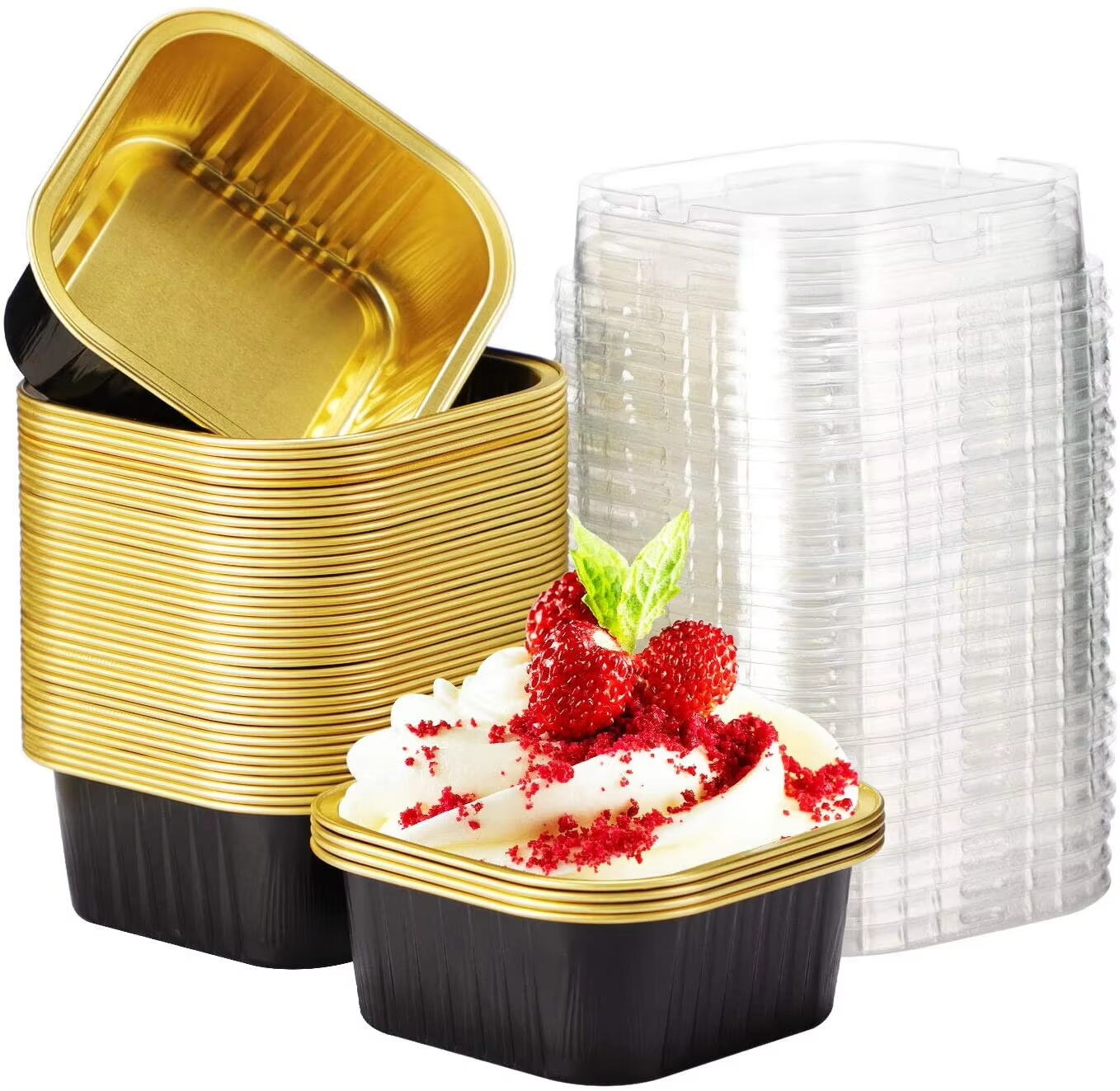Introduction to Aluminium Food Containers
Brief Overview of Popularity and Common Uses
Aluminum food containers have pretty much taken over kitchens everywhere, whether at home or in restaurants, because they work so well for so many things. People store leftovers in them, bake casseroles, and restaurants love them for takeaway meals since customers can just toss them away after eating. The market for these containers keeps growing too, according to recent reports from trade associations showing steady increases year after year. What makes aluminum containers stand out is how adaptable they are across different cooking situations while still being practical for storage purposes without taking up much space in cabinets or fridges.
Key Advantages Over Plastic and Styrofoam
Looking at materials for storing food, aluminium really beats out plastic and Styrofoam in most ways. Containers made from aluminium keep food warmer much longer than other options because of their good insulation qualities. They're also light enough to carry around but strong enough not to break easily something that happens all too often with those flimsy Styrofoam boxes when shipping or moving them around. People seem to be picking aluminium more these days, probably because everyone's getting more concerned about what happens to our environment plus there's just plain old better protection for what we eat. Plastic has had problems with letting bad stuff seep into food over time, so switching to aluminium makes sense if someone wants something that's actually safe and will last longer whether buying at stores or keeping at home.
Exceptional Durability for Long-Term Use
Resistance to Corrosion and Physical Damage
Aluminum containers resist rusting pretty well even when they get wet, which is a big plus. Because of this property, they work great for storing all sorts of foods without breaking down over time or affecting what's inside. The stuff is tough too. These containers take a beating from daily use and still hold up, so people tend to reuse them again and again. Food service businesses love this because it cuts costs significantly. Some studies show around 70 percent less damage happens with aluminum versus plastic options. No wonder restaurants and home cooks alike keep reaching for aluminum containers whenever they need something reliable for keeping food fresh.
Lightweight Design for Easy Handling
Aluminium food containers are much lighter than other options, which gives them several benefits when it comes to moving things around and getting stuff from point A to point B. Lighter weight means lower shipping bills and less fuel burned during transport, so this helps cut down on environmental impact too. For restaurants and cafes where speed matters, staff find these containers easier to work with throughout their shifts. According to surveys among kitchen workers, most prefer aluminium over heavier alternatives since lifting those heavy boxes all day can lead to back problems or other injuries. That's why so many quick service establishments stick with aluminium containers despite what some might think about cost savings alone. The balance between being light enough yet strong enough works well across different types of food service operations big and small.

Superior Heat Resistance for Versatile Applications
Oven-Safe Properties and Even Heat Distribution
Aluminum food containers stand out because they work great in ovens, which makes them pretty much essential for anyone who cooks or bakes regularly at home. Most other materials just can't handle the heat without bending or melting, but aluminum stays put even when things get really hot inside the oven. The way these containers are made helps spread heat around evenly throughout whatever's being cooked. That means less chance of those annoying burnt spots on the edges of baked goods or roasted meats. Professional chefs know this well since their kitchen equipment faces constant exposure to intense heat day after day. They rely on aluminum containers because they simply don't break down under pressure like so many alternatives do.
Freezer Compatibility and Temperature Retention
Aluminum containers do more than just handle heat well they work great in freezers too. Unlike plastic or glass alternatives that often warp or crack when frozen, aluminum stays strong even at freezing temps. The way aluminum handles temperature changes makes it really good at keeping food at consistent temperatures whether storing something hot or something cold. Research indicates food stays fresh longer inside aluminum containers compared to most other packaging options on the market today. Home cooks and professional kitchens alike have noticed this difference in food preservation quality over time, which explains why so many people keep reaching for aluminum containers again and again.
Ensuring Food Safety and Hygiene
Non-Toxic and Non-Reactive Material
Aluminum food containers keep things safe because they don't react with whatever gets stored inside. They're made from stuff that won't release bad chemicals into food, so nothing changes how what's inside tastes or looks over time. Most nutritionists and食品安全 regulators agree aluminum is totally fine for touching food, which explains why so many households and restaurants rely on them every day. For anyone concerned about keeping food fresh and uncontaminated during storage, knowing aluminum doesn't mess with the food quality gives peace of mind when planning meals ahead.
Barrier Against Contaminants and Microorganisms
Aluminum containers work pretty well at keeping out outside stuff that can mess with food quality, which makes them good for keeping things clean and safe to eat. The way they block germs and those nasty bacteria means food lasts longer without going bad. Studies have shown that when people actually use aluminum packaging right, there tends to be fewer problems with contamination. Most companies making these containers know how important cleanliness is throughout their manufacturing process, so they put extra effort into meeting all those safety requirements. Because of this attention to detail, we see aluminum becoming increasingly popular across various sectors where food safety matters most.
Eco-Friendly and Fully Recyclable
100% Recyclability and Reduced Environmental Impact
Aluminum food containers really shine when we look at modern packaging options because they can be recycled over and over again without losing quality. What makes them special is that every single one of these containers goes back into the system after use, cutting down on what ends up in landfills and helping create a more circular approach to materials. Recycling aluminum actually works pretty well compared to making it fresh from bauxite ore, needing just about 5 percent of the energy needed for primary production according to industry figures. Environmental research shows that when companies focus on collecting used aluminum products, especially those used for food storage, there's a noticeable drop in greenhouse gas emissions linked to packaging waste. For manufacturers looking at long term sustainability goals, this kind of eco-friendly attribute explains why many are switching to aluminum as their go to option for food container solutions.
Energy Efficiency in Recycling Processes
Aluminium recycling saves a lot of energy compared to producing new metal from scratch, making it an attractive option for companies looking to cut down on manufacturing expenses. When we recycle aluminium instead of mining bauxite ore, we save about 95% of the energy needed for primary production and avoid all that digging up land which can really mess with local wildlife habitats. Market research shows this trend towards recycled aluminium is growing fast right now. Many factories are switching over because consumers want greener products these days. The whole industry seems to be moving in this direction, trying out different ways to balance green goals with keeping their bottom lines healthy at the same time.
Comparison with Plastic and Styrofoam Waste
Aluminium food containers stand out from plastic and Styrofoam when it comes to how they affect the environment. When thrown away instead of being recycled, aluminium actually breaks down much faster than plastic, which can stick around for hundreds of years. We've all seen those shocking numbers about plastic waste choking our oceans these days. Meanwhile, most aluminium gets recycled again and again. Recent market research shows people are increasingly reaching for products packaged in aluminium rather than plastic. This shift makes sense given how bad plastic has become for ecosystems worldwide. Plus, consumers want options that feel better for the planet. The fact that aluminium decomposes quicker and recycles so well means it plays a real part in moving toward more sustainable ways of packaging food.
FAQ
What are the main benefits of using aluminium food containers over plastic and Styrofoam?
Aluminium food containers offer better insulation, are lightweight yet strong, and are environmentally friendly compared to plastic and Styrofoam. Unlike plastic that can leach harmful chemicals, aluminium is non-toxic and does not release any substances into food.
Can aluminium food containers be used in the oven or freezer?
Yes, aluminium food containers can safely be used in both ovens and freezers. They have excellent heat-resistant properties, evenly distribute heat, and are also freezer compatible, thus suitable for various temperature applications.
How do aluminium containers contribute to food safety?
Aluminium containers are non-reactive and non-toxic, ensuring that food quality and taste are preserved. They also act as strong barriers against contaminants and microorganisms, enhancing hygiene and food safety.
Are aluminium food containers environmentally friendly?
Absolutely, aluminium containers are 100% recyclable, reducing environmental impact by minimizing landfill waste and supporting a circular economy. They consume less energy during the recycling process, making them a more sustainable choice than plastic or Styrofoam.


